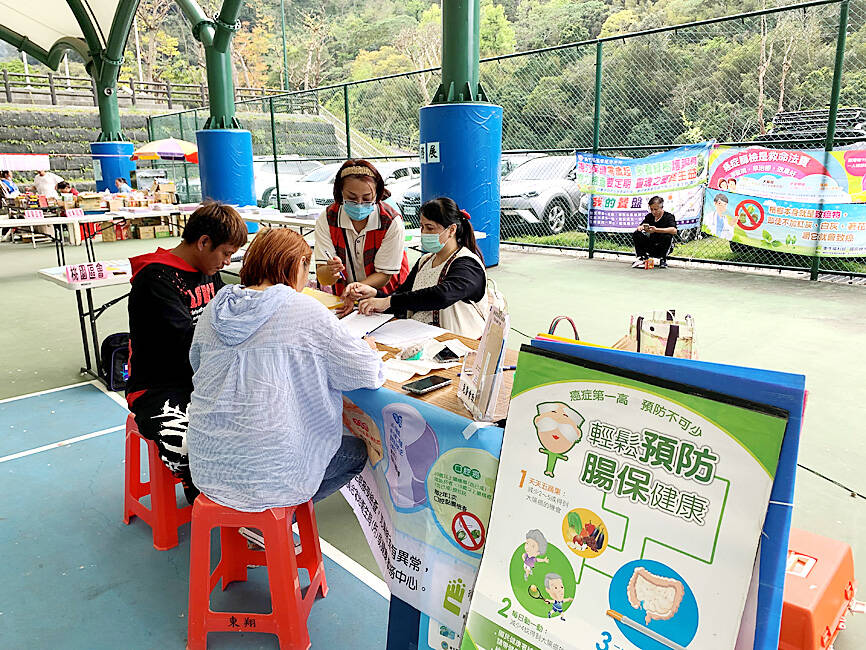A Taipei Medical University research team found that the hemoglobin concentration levels resulting from fecal occult blood tests (FOBT) can predict the risk and mortality of colorectal cancer, and could be used to suggest the interval between screenings.
The research team was led by the university’s College of Oral Medicine associate dean Sam Chen (陳立昇) and Amy Yen (嚴明芳), and the study was published in May in JAMA Oncology, a monthly peer-reviewed medical journal.
Colorectal cancer was the third leading cause of cancer deaths in Taiwan last year, Chen said, adding that government-funded FOBT is offered every two years to people aged 50 to 74 for routine screening of colorectal cancer.

Photo courtesy of the Hsinchu County Government
The cohort study included data from more than 3.5 million people who received the FOBT from 2004 and 2014, and followed up until 2019. It analyzed the data to study the relationship between fecal hemoglobin concentration and colorectal tumors, and death from colorectal cancer.
Chen said they found that increasing fecal hemoglobin concentration levels indicate more colorectal tumors and higher colorectal cancer mortality risk, allowing for stratification of risk groups, and can be used for calibrating suitable screening intervals.
Usually, a hemoglobin concentration level above 20mcg/g is considered positive, with a higher risk of cancer and requiring a colonoscopy follow-up, he said.
About half of those who had a positive FOBT result were detected to have polyps in a colonoscopy follow-up, while about 20 percent had progressive polyps, and about 5 percent had colorectal cancer, he said.
Chen said their study found that fecal hemoglobin concentration levels can be used to more accurately assess colorectal cancer risk and mortality rates, and to personalize screening intervals, with shorter intervals for higher fecal hemoglobin levels.
The biennial FOBT has been proven to reduce the risk of late-stage colorectal cancer by 29 percent and the risk of colorectal cancer death by 35 percent, he said.
Their findings further demonstrated how to achieve precision inter-screening intervals for optimizing the use of FOBT and colonoscopy, he said.
With personalized fecal hemoglobin concentration screening, FOBTs can be reduced by 49 percent and colonoscopies by 28 percent, he said, adding that this could optimize medical resources, and reduce unnecessary testing and risks while ensuring that high-risk groups get necessary testing and treatment promptly.

Taiwan is stepping up plans to create self-sufficient supply chains for combat drones and increase foreign orders from the US to counter China’s numerical superiority, a defense official said on Saturday. Commenting on condition of anonymity, the official said the nation’s armed forces are in agreement with US Admiral Samuel Paparo’s assessment that Taiwan’s military must be prepared to turn the nation’s waters into a “hellscape” for the Chinese People’s Liberation Army (PLA). Paparo, the commander of the US Indo-Pacific Command, reiterated the concept during a Congressional hearing in Washington on Wednesday. He first coined the term in a security conference last

Prosecutors today declined to say who was questioned regarding alleged forgery on petitions to recall Democratic Progressive Party (DPP) legislators, after Chinese-language media earlier reported that members of the Chinese Nationalist Party (KMT) Youth League were brought in for questioning. The Ministry of Justice Investigation Bureau confirmed that two people had been questioned, but did not disclose any further information about the ongoing investigation. KMT Youth League members Lee Hsiao-liang (李孝亮) and Liu Szu-yin (劉思吟) — who are leading the effort to recall DPP caucus chief executive Rosalia Wu (吳思瑤) and Legislator Wu Pei-yi (吳沛憶) — both posted on Facebook saying: “I

The Ministry of Economic Affairs has fined Taobao NT$1.2 million (US$36,912) for advertisements that exceed its approved business scope, requiring the Chinese e-commerce platform to make corrections in the first half of this year or its license may be revoked. Lawmakers have called for stricter enforcement of Chinese e-commerce platforms and measures to prevent China from laundering its goods through Taiwan in response to US President Donald Trump’s heavy tariffs on China. The Legislative Yuan’s Finance Committee met today to discuss policies to prevent China from dumping goods in Taiwan, inviting government agencies to report. Democratic Progressive Party Legislator Kuo Kuo-wen (郭國文) said

The Ministry of Economic Affairs has fined Taobao NT$1.2 million (US$36,900) for advertisements that exceeded its approved business scope and ordered the Chinese e-commerce platform to make corrections in the first half of this year or its license would be revoked. Lawmakers have called for stricter supervision of Chinese e-commerce platforms and more stringent measures to prevent China from laundering its goods through Taiwan as US President Donald Trump’s administration cracks down on origin laundering. The legislature’s Finance Committee yesterday met to discuss policies to prevent China from dumping goods in Taiwan, inviting government agencies to report on the matter. Democratic Progressive Party